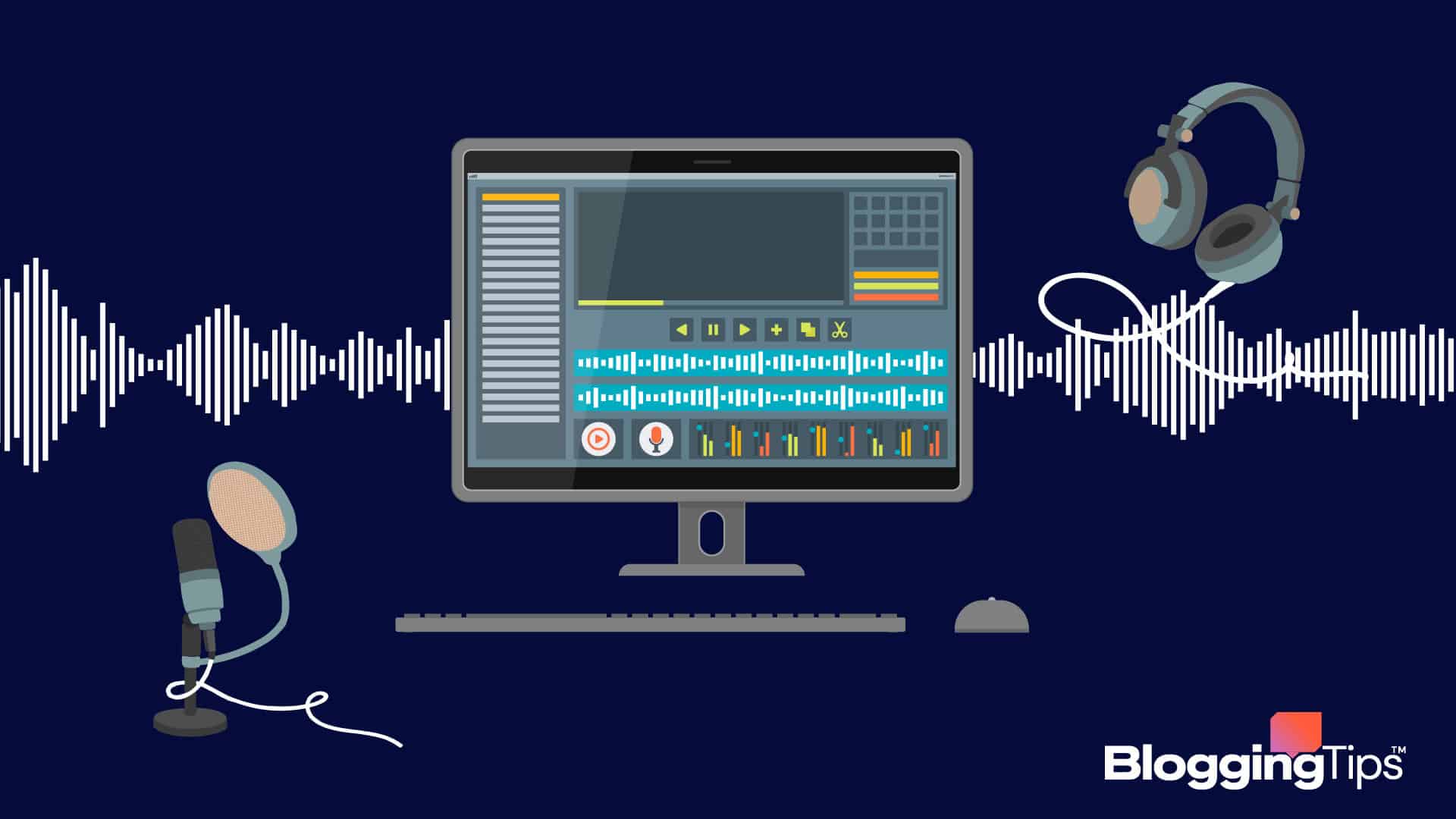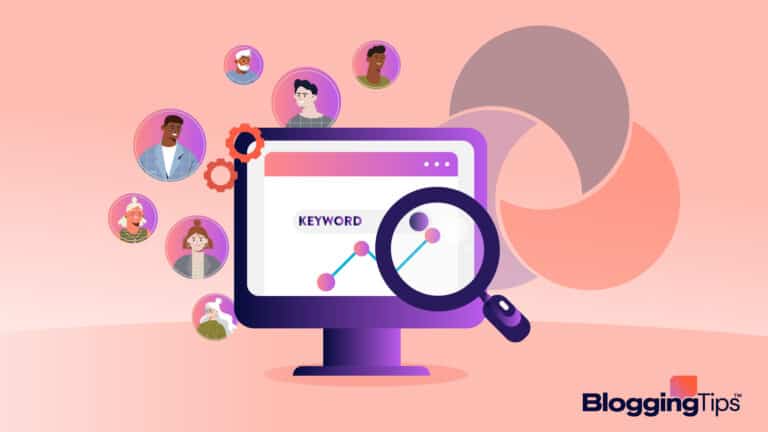Podcasting is an increasingly popular way to share content.
As this medium grows, so does the need for high-quality podcast editing software.
In this article, we will discuss what podcast editing software is and why it’s essential to use it.
Then, we will compare some of the best podcast editing software tools on the market so you can find the right option for your needs.
- Best Podcasting Editing Software (Overview)
- An Overview of Podcasting Editing Software
- Features To Look For in Podcasting Editing Software
- Best Podcasting Editing Software: Our Top 3 Options [Ranked & Reviewed]
- The Best Free Podcasting Editing Software Options
- Notable Mentions: Notable Mentions: Other Podcasting Editing Software To Check Out
- Even More Options To Check Out
- Other Products Relevant To Podcasting Editing Software
- Frequently Asked Questions
- Wrapping Up
Best Podcasting Editing Software (Overview)
We’ve included an overview of our top picks below. For detailed information on each pick, scroll down.
Our Top Picks
- Alitu – Our Pick
- Adobe Audition – Runner-Up
- WaveLab 10 – Budget Pick
Notable Mentions
Quick Breakdown of Our Suggestions
Let’s take a look at two of the best podcast editing software tools on the market.
What Is the Best Podcasting Editing Software?
Alitu is the best podcasting editing software.
It’s an all-in-one podcasting platform that makes podcast editing easy.
With Alitu, you can record, edit, and publish your podcast without any prior podcasting experience.
What Is the Best Free Podcasting Editing Software?
Audacity is the best free podcasting editing software.
It’s a free, open-source audio editor popular among podcast creators.
Audacity offers features that make it a quality option for podcast editing without incurring costs.
An Overview of Podcasting Editing Software
Understanding which podcast editing software tool to use for your podcasting efforts can seem confusing if you’re new to the game.
Do your research and read up on the basics before making any decisions.
What Is Podcasting Editing Software?
At its core, podcast editing software is a tool used to help podcast creators edit their audio content.
It can include adding effects, removing background noise, and splicing together different sections of audio.
Why Is Podcasting Editing Software Important?
Podcast editing software is essential because it helps podcast creators produce quality content.
By using podcast editing software, you can ensure that your podcast sounds professional and polished.
As well, your software choice can save time by allowing you to edit your content faster.
Do I Need Podcasting Editing Software?
If you’re serious about podcasting, then yes, you need podcasting editing software.
Invest in proper podcasting tools if you want to produce a quality show.
The days of bad-sounding podcasts making a dent are over. Your audience expects a more polished approach.
Features To Look For in Podcasting Editing Software
Now that you know which editing software for podcasts is best and what a free option looks like, it’s time to decide what qualities to look for when making your own choice of software.
1. Ease of Use
If you’re new to podcasting, look for software with a user-friendly interface.
The goal is to make podcasting as fun as possible, so don’t get discouraged if your preferred software is a little overwhelming at first.
Most software offers tutorials to help you navigate the dashboard.
2. Audio Editing
Audio editing is the core function of podcasting editing software.
Look for software with various audio editing features, such as sound effects, equalization, and noise reduction.
If you’re serious about podcasting, you’ll want to invest in software that gives you complete control over your audio.
3. Effect Tools
Effect tools are optional but fun to play with.
Look for a solution offering built-in effects, such as reverb, delay, and chorus.
These effects can add depth and dimension to your podcast.
4. File Splicing
File splicing is a helpful feature for podcasting beginners.
One common reason for starting a recording over realizes you made a mistake.
You want the ability to splice together audio files easily.
It allows you to edit out any dead space or mistakes without starting over from the beginning.
5. Price
The price of podcasting editing software varies widely.
You can find free and open-source solutions, as well as high-end professional software.
The most effective podcasting editing software for you is the solution that fits your needs and budget.
One way to start is to use a free podcast editing option.
Then, upgrade to a more robust software selection when you can afford it.
Best Podcasting Editing Software: Our Top 3 Options [Ranked & Reviewed]
If you’re looking to improve your podcasting skills, we recommend using one of the following three podcast editing software tools.
Alitu: Our Pick
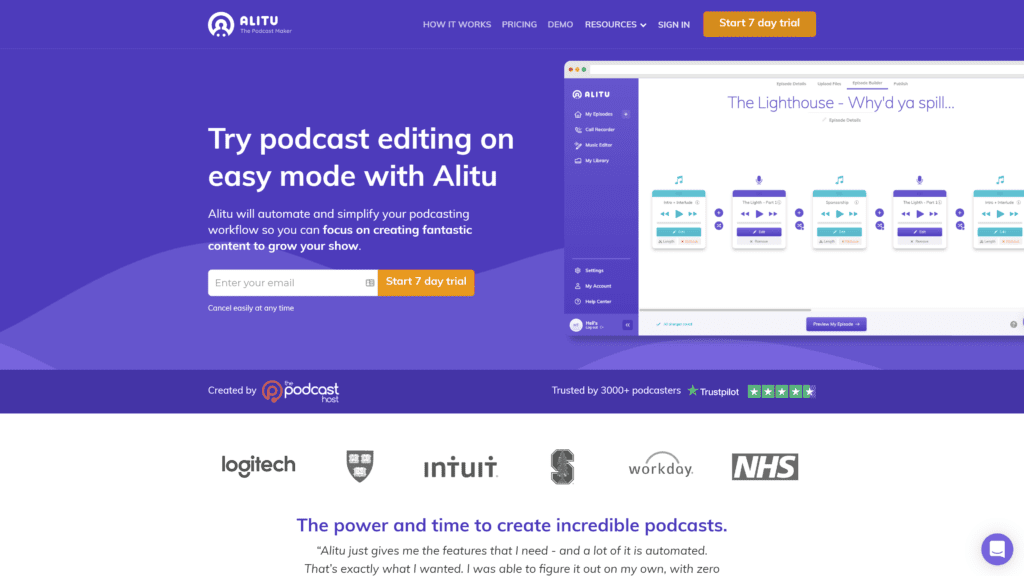
Alitu is our top podcast editing software recommendation.
It’s an AI-powered podcast editor that makes podcasting simple.
You don’t need podcasting experience to use Alitu.
Record your audio, upload it to the Alitu app, and let the software do the rest.
Key Features of Alitu
Alitu comes with features to help you create an engaging podcast.
- Built-in podcast player: Listen to your podcast as you edit it. Doing so allows you to make sure that everything sounds just the way you want it to.
- Automatic audio leveling: The feature evens out the volume of your podcast.
- Automatic podcast transcription: Alitu generates a transcript of your podcast as you edit it. It is helpful if you want to add closed captioning to your podcast or create a blog post from your episode.
- Podcast RSS feed: Alitu creates an RSS feed for your podcast so you can efficiently distribute it to podcast directories.
- Recording: Use this feature to record from anywhere. You can replace any need for Zoom, your phone’s recording app, or Skype.
Why Is Alitu a Great Solution?
There are several reasons why we believe that Alitu is the best podcast editing software on the market.
First, it’s easy to use. Second, Alitu does all of the heavy lifting for you.
You will never worry about things like audio levels or podcast transcription. The software takes care of it all.
Finally, Alitu is affordably priced. It won’t break the bank to choose the monthly or annual pricing plan.
Pros of Alitu
- Alitu audio cleanup: With one click, Alitu can clean up your podcast audio, so it sounds polished and professional.
- Automatically save audio: Alitu saves your audio as you edit. It means that you never have to worry about losing your work.
- Works in all browsers: Alitu works in any browser, which makes it accessible from anywhere.
Cons of Alitu
- RSS feed: Some users have noted that they wish for a more robust podcast RSS feed feature.
- Cloud recordings: The Alitu app records directly into the cloud. It does record locally to your browser, but it’s not the default setting. Based on feedback, the company will soon reverse this scenario to make the browser recording the default option.
- Little control: If you want more control over the editing process, you may not enjoy the automatic editing process that beginners enjoy.
Alitu vs. Other Top Recommendations: How They Compare
Alitu is similar to Adobe Audition in that each software solution allows you to record and edit a podcast.
Adobe Audition also offers free sound effects and noise reduction features.
An exciting aspect of Adobe Audition is how you can restore files if you made an edit you’re unhappy with.
WaveLab 10 is more expensive than Alitu.
You will spend at least one hundred dollars more for WaveLab than you will with Ailut.
However, WaveLab 10 does offer several interesting features that appeal to podcast editors.
For example, WaveLab 10 offers podcast templates and podcast-specific effects.
Alitu Pricing
- $38 per month
- $380 per year
Optional add-ons include the following pricing plans.
- Up to 1,000 downloads per month: Free
- Up to 10,,000 downloads per month: $10 per month
- Up to 50,,000 downloads per month: $30 per month
- Up to 100,,000 downloads per month: $60 per month
Can You Try Alitu for Free?
Yes, you can try the Alitu free trial.
The podcast software company gives you seven days to try it.
Use all the features during your first week to make sure you want to continue.
Then, continue on the monthly or annual plan.
Conclusion: Should You Choose Alitu?
Alitu is our top pick because it’s a podcast solution that is easy to use, even if you’re a beginner.
The podcast editing software also cleans up your audio with one click and offers automatic transcription.
If you’re looking for an affordable podcast editing solution, we recommend giving Alitu a try.
You will discover that it eliminates much of the guesswork involved with producing top-notch podcast content.
Adobe Audition: Runner-up
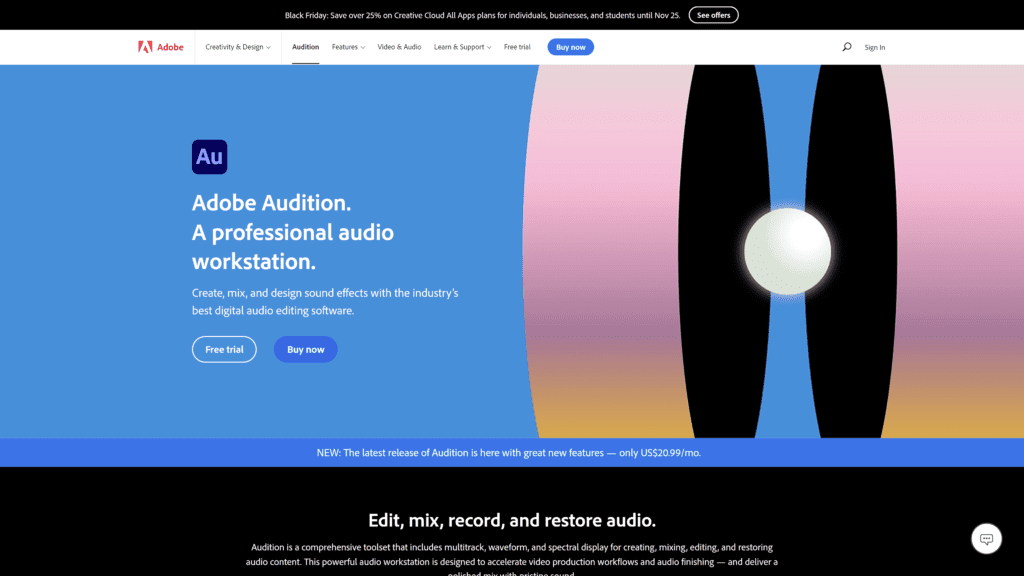
If you’re looking for podcast editing software that offers more control than Alitu, Adobe Audition is an option.
The software gives you granular control over the editing process.
You can also fine-tune your audio to get it just right.
Key Features of Adobe Audition
Adobe Audition provides all the expected features when you’re looking for superior podcast editing software.
- Record your podcasts: The podcasting software allows you to record your podcast episodes directly into the app.
- Edit your audio: You can make your podcast episode’s audio perfect with Adobe Audition. You’ll enjoy all the control you might want throughout the editing process.
- Rearrange content: It’s easy to rearrange content within your podcast episode using Adobe Audition.
- Strip silence: Strip silence is an audio recording tool that automatically eliminates silent or inactive areas in recorded audio clips without disrupting synchronization in multitrack recordings.
- Loudness meter: The loudness meter ensures your content meets industry standards for loudness, so you can rest assured knowing your audio is consistent and compliant.
Why Is Adobe Audition a Great Solution?
Adobe Audition works on any platform.
Audition provides specialized tools for cleaning up or restoring audio.
Furthermore, it provides precise, nondestructive editing for commercial and corporate videos and podcasts.
Audition doubles as a digital audio workstation (DAW).
The software is perfect for creating sound effects or final audio files for a video project, podcast, gaming effects, and more.
Pros of Adobe Audition
- Add sound effects: The podcast editing software also comes with a library of free sound effects that you can use in your podcast episodes.
- Cross-platform support: Adobe Audition is available for both Windows and macOS computers.
- Intuitive interface: The podcasting software provides an intuitive interface that makes it easy to find your needed tools.
Cons of Adobe Audition
- Can’t use MIDI: It’s not possible to use MIDI with Adobe Audition. MIDI is a protocol that allows computers to communicate with musical instruments.
- Advanced functions: Although anyone can use the software after a little practice, some of the functions work better for advanced users.
- Managing media files: It could use improvement in the way it manages media file elements. It doesn’t currently do it in a unified way.
Adobe Audition vs. Other Top Recommendations: How They Compare
Here’s how Adobe Audition stacks up against two of our other top podcast editing software recommendations.
It’s a little harder to use than Alitu. Beginners typically find Alitu more intuitive.
However, you may enjoy Adobe Audition more if you have experience and want to gain more control over the podcasting editing experience.
Compared to WaveLab 10, Adobe Audition provides more podcast-specific features.
For example, Adobe Audition offers podcast templates to help you get started.
Both software options provide easy-to-use interfaces and come with a library of sound effects that you can use in your podcast episodes.
Adobe Audition Pricing
- Adobe Audition: $20.99 per month
- Creative Cloud All Apps upgrade: $54.99 per month
Can You Try Adobe Audition for Free?
Yes, Adobe Audition provides a free 7-day trial.
During the trial, you gain access to all the Audition features and 100 GB of cloud storage.
Use the software extensively during this time to learn whether you will continue using it.
Conclusion: Should You Choose Adobe Audition?
Overall, Adobe Audition comes in as our top runner-up because it’s a powerful podcast editing software.
It’s available for both Windows and macOS computers and gives you an intuitive interface.
If you’re looking for podcast-specific features like templates and support for multiple tracks, Adobe Audition is the podcast editing software for you.
WaveLab 10: Budget Pick
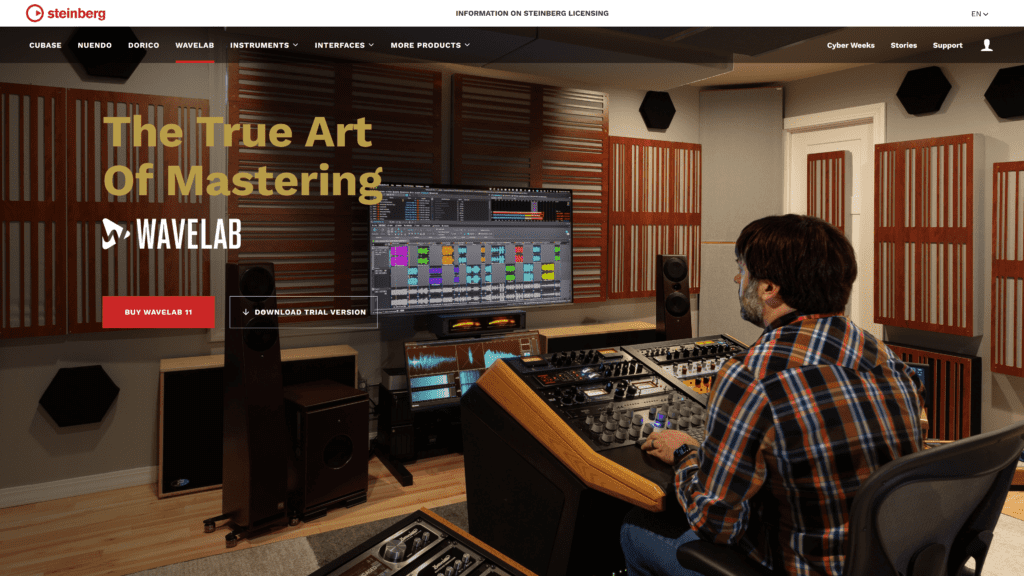
Using WaveLab 10, you can record, edit, and master your podcast episodes with ease.
WaveLab caters first to musicians who want to edit their music files.
However, it works well as a podcast editor as well.
It will help you create masterful mixes and ensure that your podcast listeners enjoy every minute of each episode you put out into the world.
Key Features of WaveLab 10
WaveLab 10 gives you all the vital features necessary for podcast productions.
- Remove unwanted noise: The podcast editing software has a noise reduction tool that helps you remove any unwanted background noise from your recordings.
- EQ and effects: The software also comes with an equalizer, which is excellent for adjusting the sound of your recorded episodes. You can also add different effects, like reverb and delay, to create a more polished audio file.
- Crossfades: You can use WaveLab 10 to add crossfades between audio segments. It is a crucial podcasting editing technique that helps make your podcast episodes flow smoothly.
- Waveforms: The software displays the waveforms of your audio files so you can see exactly what you’re working with.
- Markers: You can add markers throughout your audio files. It is helpful when you need to refer back to specific parts of your podcast episodes during the editing process.
Why Is WaveLab 10 a Great Solution?
WaveLab 10 provides an easy-to-use and budget-friendly podcast editing solution.
The software doesn’t have as many bells and whistles as some of the other podcast editing software on our list.
However, it offers all the key features necessary for producing a podcast you feel proud to release.
Pros of WaveLab 10
- Simple dashboard: The podcast editing software has a straightforward interface. You won’t need to spend hours learning how to use the software.
- 20 add-on plugins: You can purchase additional plugins to add more features to the software. For example, you can use a voice-over toolkit or an audio restoration plugin.
- Multiple file formats: WaveLab 10 supports various audio file formats, including MP3, WAV, and AIFF. You can render your files in one of 15 format options.
Cons of WaveLab 10
- Upgrade challenges: If you have an older version of WaveLab, watch out for a glitchy experience when upgrading to WaveLab 10. It doesn’t happen to everyone, but you may need to do some additional configurations.
- Glitchy plugins: Some third-party plugins frustrate users when they don’t connect immediately.
- Three tracks: If you want to record more than three tracks per session, you’re out of luck. WaveLab 10 caps you out at the three-track maximum.
WaveLab 10 vs. Other Top Recommendations: How They Compare
Both Adobe Audition and WaveLab 10 offer podcast editors an array of features.
However, Adobe Audition provides a few more features than WaveLab 10.
The podcast editing software from Adobe gives you the ability to edit video files as well as audio files.
You can also add effects like echo and reverb.
Compared to using Alitu, you need more editing skills to use WaveLab 10.
Alitu does a lot of the work for you due to its artificial intelligence technology.
However, you may want to select WaveLab 10 if you enjoy getting your hands dirty during the podcast editing process.
WaveLab 10 gives you more control while tweaking your audio files.
WaveLab 10 Pricing
- WaveLab Pro: $499.99
- WaveLab Elements: $129.99
While you can buy Alitu or Adobe Audition at lower monthly prices, WaveLab 10 gives you the ability to pay one time.
You will save money if you use WaveLab for several years while avoiding future payments.
Can You Try WaveLab 10 for Free?
Yes, you can take advantage of the free 30-day trial.
WaveLab doesn’t restrict any of the features during your trial period.
You should know within the first month of use whether WaveLab 10 is the correct fit for your podcast editing needs.
You can use the trial without providing credit card details.
Conclusion: Should You Choose WaveLab 10?
Overall, WaveLab 10 podcast editing software provides an excellent solution for those who want to avoid a monthly software subscription.
In addition, the additional plugins provide podcast editors with the opportunity to enhance their audio files as needed.
The software provides all of the key podcast editing tools you need to produce a show.
The Best Free Podcasting Editing Software Options
If you’re interested in free podcast editing software, here are two options for you to consider.
Audacity
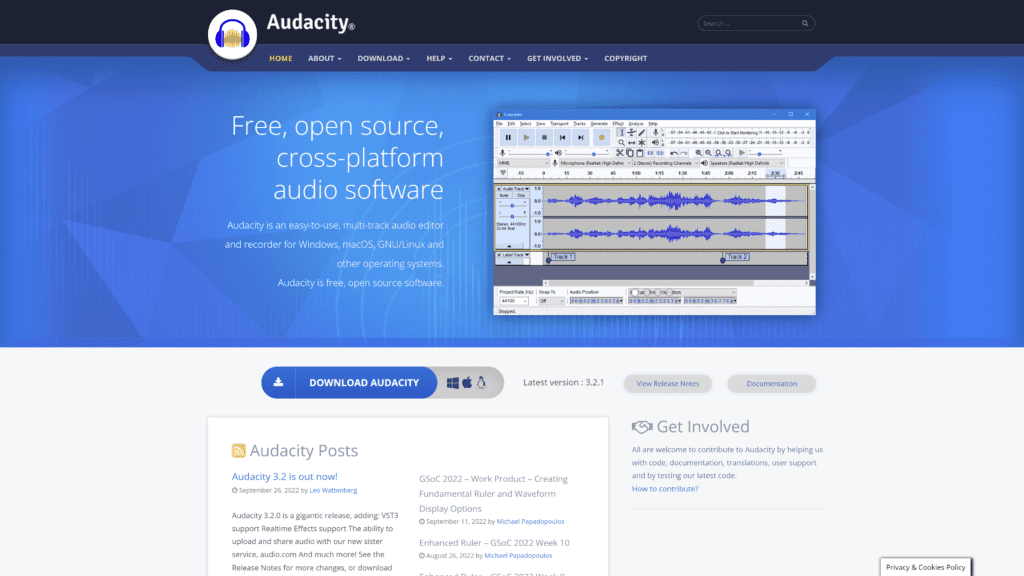
Audacity is a podcast editing software that’s available for Windows, macOS, and Linux.
The software is an open-source project, which means anyone can use or improve the code.
Audacity offers users a host of features, including the ability to edit audio files with precision, various effects that you can add to your audio files, noise removal features, and amplification features.
Why Is Audacity a Great Solution?
One of the best reasons to try Audacity is that the podcast editing software is available for free.
Once you familiarize yourself with the interface, you can start podcast editing without spending any money.
Audacity also provides users with a wide range of features, which is impressive given that the software is free.
For example, you can use Audacity to edit podcast files with precision.
You can also add various effects to your audio files, including fade-in/fade-out features, echo features, and reverb features.
Drawbacks to Audacity
Although Audacity is a quality podcast editing software solution, it does have a few drawbacks.
For starters, the software is challenging to use for podcast editors new to the world of audio editing.
The interface isn’t as user-friendly as some of the other podcast editing software options on the market.
In addition, Audacity doesn’t provide users with built-in hosting features.
This means you’ll need to find a separate podcast hosting solution if you want to launch your podcast.
Restream
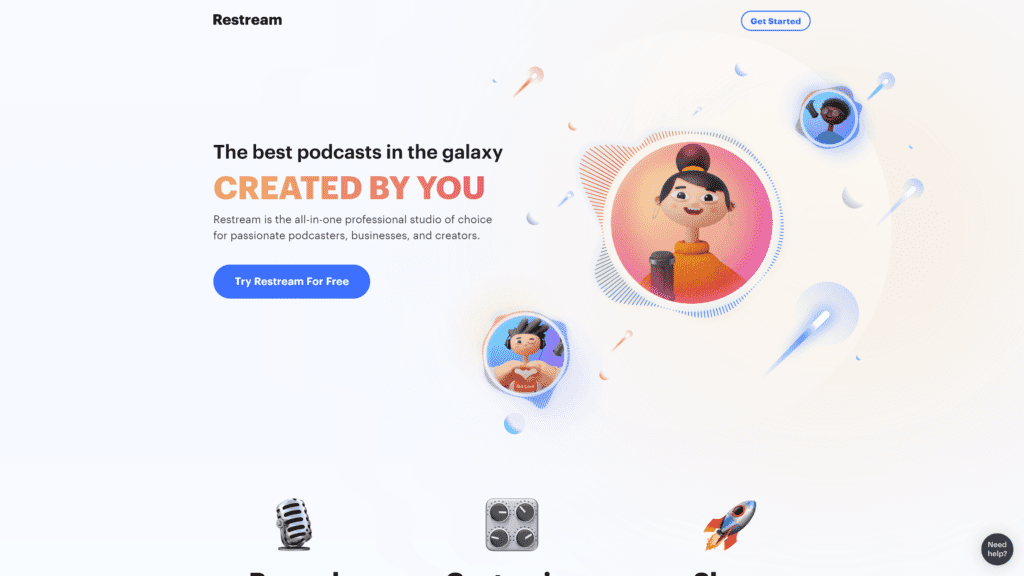
Restream gives users several features, including the ability to record Skype calls, add various effects to audio files, and the opportunity to edit audio files.
The podcast editing software also allows users to add intros/outros to their podcast episodes.
Why Is Restream a Great Solution?
Restream is an excellent podcast editing solution for those who want to record Skype calls with ease.
The podcast editing software makes it simple to record your Skype calls, which is a valuable feature for podcast editors who conduct Skype interviews.
The intros/outros aspect of the software means you can give your podcast a professional polish.
Drawbacks to Restream
Similar to Audacity, you will need to give yourself time to learn the Restream dashboard.
While it’s a free piece of software, it doesn’t provide the most streamlined user experience in the backend.
Notable Mentions: Notable Mentions: Other Podcasting Editing Software To Check Out
If you’re on the fence regarding which podcast editing software to pick, check out our “notable mentions.”
The best option for you might appear here.
You can test various podcast editing software programs from this section by taking advantage of their free trials.
Riverside
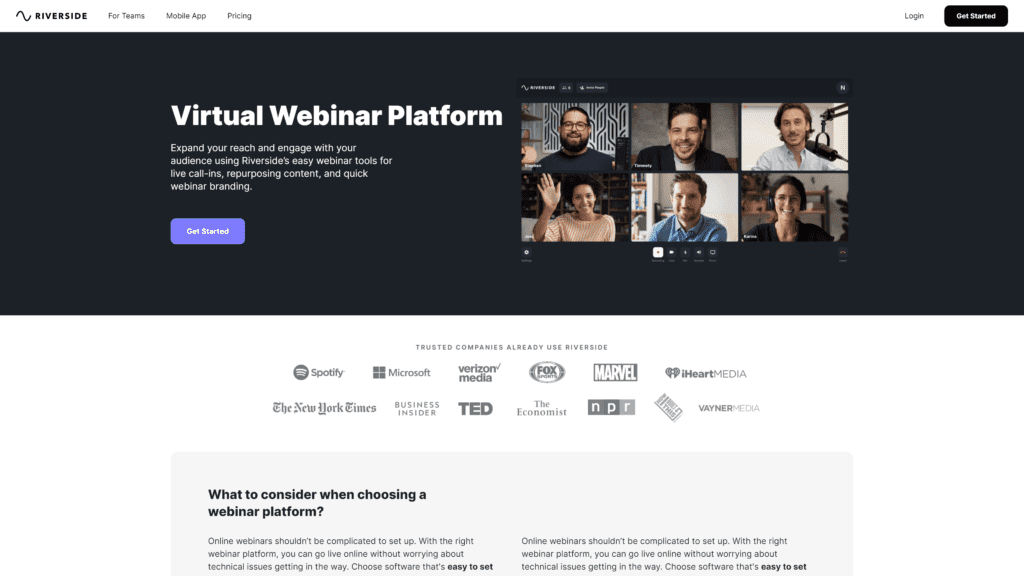
Via its podcast editing software, Riverside helps media companies and podcasters record remote interviews.
The editing software solution offers features that help users edit their audio files with precision.
Even Mark Zuckerberg and Gary Vee used Riverside to discuss a conversation about the Metaverse and Web 3.0.
Why Is Riverside a Great Option?
Use Riverside if you’re interested in a browser solution.
Each recording goes straight to your browser via uncompressed 48kHz WAV audio files.
The quality is a step up from what you’re used to when hopping on a company or client Zoom call.
Once your podcast interview ends, you can download the audio file for editing.
You won’t need to wait for any upload times as the app saves your podcast recording as you perform.
Another excellent advantage of Riverside is that the software separates the audio and video files for you.
It does this for each participant, giving you all the control during the post-production process.
Using the app’s Magic Editor, you can make your podcast episode perfect in only a few clicks.
Drawbacks to Riverside
Its simplicity might become your downfall when you need more nitty-gritty control over the podcast editing process.
If you need to tweak your episodes more manually, you might want to try one of the other software solutions on our list.
Riverside Pricing
- Free
- Standard: $15 per month
- Pro: $24 per month
- Teams: Ask the Riverside sales team for a quote
Can You Try Riverside for Free?
Yes, you can use the free plan from Riverside for as long as possible.
If you need additional features, you can consider upgrading to one of the paid plans.
For example, you might want to upgrade when you want to remove the Riverside watermark, increase recording time, access better audio quality, or separate your tracks for longer periods.
Logic Pro X
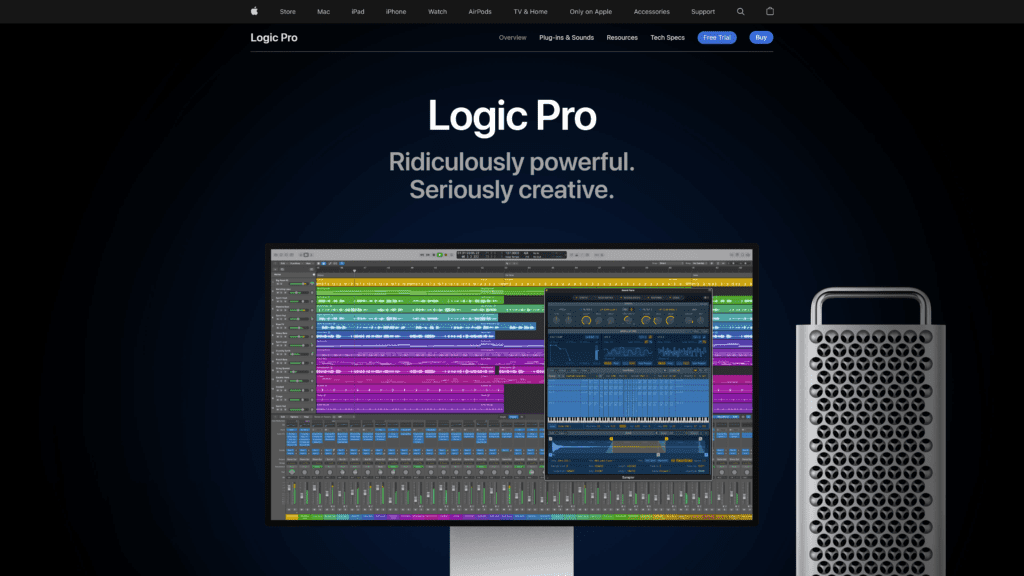
When you choose to use Logic Pro X as your podcast editing software, you get a powerful solution that’s jam-packed with features.
The podcast editing software offers a recording studio that helps podcast editors create professional-sounding episodes.
Logic Pro X has over 200 virtual instruments, a massive sound library, and advanced MIDI functionality.
You also get access to an integrated sampler, an arsenal of effects and processors, and a wealth of creative tools.
All these features are available through a single window interface.
Why Is Logic Pro X a Great Option?
As a podcast editor, you can use Logic Pro X to record podcast interviews, edit audio files, add sound effects, and more.
You can also mix and master your podcast episodes.
What’s more, Logic Pro X integrates with Apple’s GarageBand and MainStage 3.
It means you can bring your audio files into those apps for further editing and processing.
Drawbacks to Logic Pro X
One of the main drawbacks to Logic Pro X is its cost.
At $199.99, it’s one of the more expensive podcast editing software solutions on our list.
Another thing to remember is that Logic Pro X is only available for macOS.
So, if you’re a Windows user, you’ll need another podcast editing software solution.
Logic Pro X Pricing
You can buy Logic Pro X for $199.99.
With your purchase, you can access the features mentioned above.
It also gives you advantages like the gain tool, which lets you adjust the dB level.
Can You Try Logic Pro X for Free?
Yes, Apple lets you try Logic Pro X free for 90 days.
Use this time to try all the features and ensure you’re excited to invest in the software once your trial period ends.
During the trial, you can access all the same features a paid account brings to you.
GarageBand
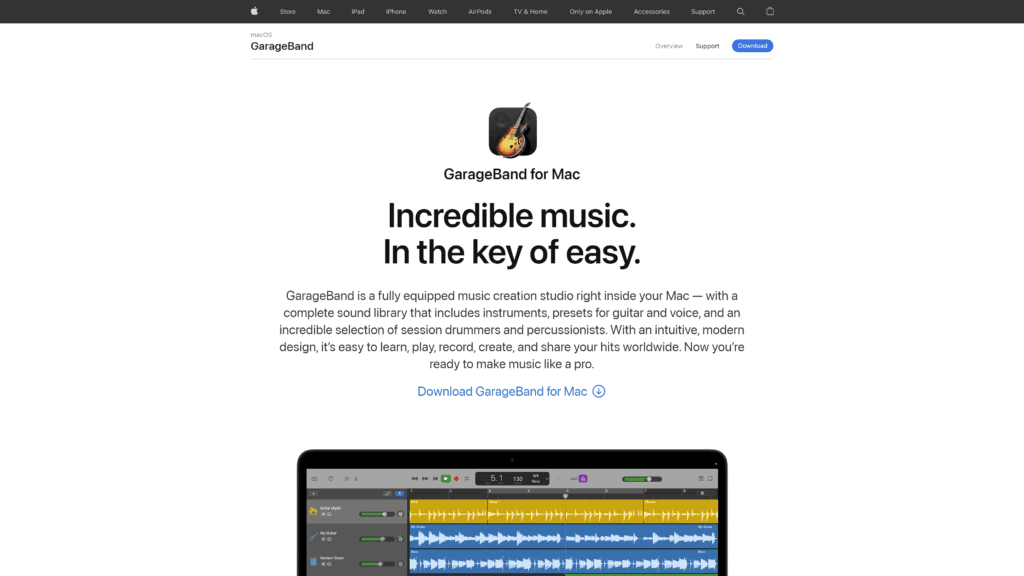
Although GarageBand is officially a music creation studio, podcast editors can also use the software to create podcast episodes.
The podcast editing software offers users a simple way to record and edit audio files.
Using GarageBand means you’re in complete control over each episode’s audio file.
Why Is GarageBand a Great Option?
GarageBand is an excellent podcast editing solution for Mac users on a budget.
The podcast editing software is available for free through the Mac App Store.
With GarageBand, podcast editors have access to several features that help when you’re recording podcast interviews or running a solo show.
For instance, GarageBand lets you add sound effects that bring more life to each episode.
Or, use the editing suite to adjust and splice your audio files.
You can also use GarageBand sound editing software to mix and master your episodes.
Drawbacks to GarageBand
One of the main drawbacks of GarageBand is that it doesn’t offer as many features as some of the other podcast editing software solutions on our list.
Similar to the above-mentioned Logic Pro X product, you can only use GarageBand if you own a Mac machine.
You’ll need to look elsewhere for your podcasting editing needs if you use Windows.
GarageBand Pricing
GarageBand is free. Go to the Mac App Store and download it without paying money.
Once downloaded, you can begin editing your first podcast episode.
Can You Try GarageBand for Free?
Not only can you use GarageBand for free, but you can use it for as long as you desire.
The product is a “forever free” option for editing music, podcasts, and any other type of audio file.
Reaper
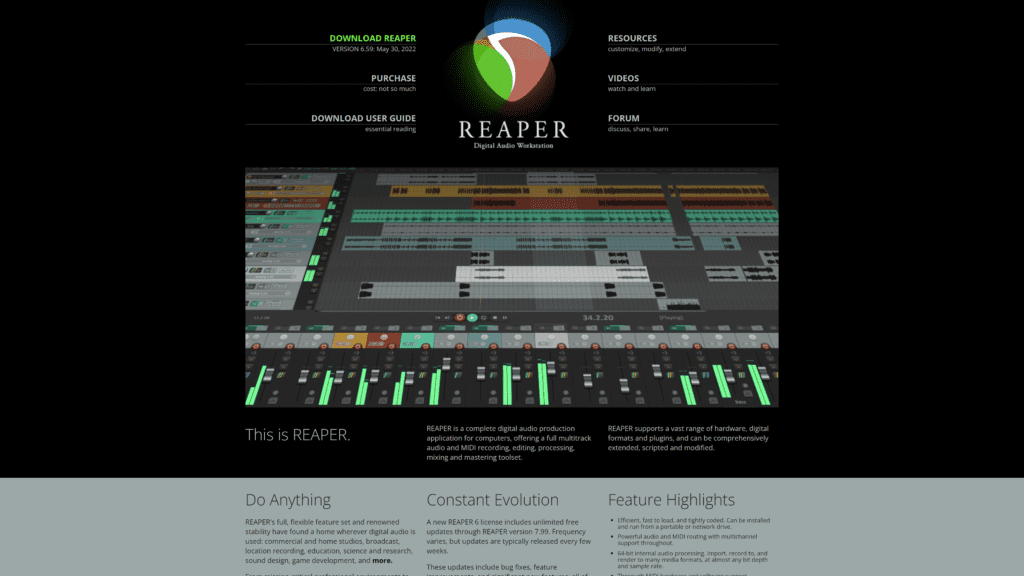
Reaper podcasting software is a digital audio workstation (DAW).
It’s available for both Windows and macOS.
Podcast editors can use Reaper to record, edit, mix, and master their podcast episodes.
The podcast editing software also supports VST plugins.
A VST plugin is a software effect or instrument that you can use during the mixing and mastering process.
So, if you want to use specific effects or processors during your podcast editing sessions, Reaper podcast software can handle those requests.
Why Is Reaper a Great Option?
Reaper podcasting software is an excellent podcast editing solution for those who want full control over their audio files.
The podcast editor offers users an unlimited number of tracks.
It means you can record as many podcast interviews as you like and never have to worry about running out of space.
The podcast editing software also doesn’t place any time limits on your recording or editing sessions.
Take as long as you need to get each podcast episode just right without a worry in the world.
Drawbacks to Reaper
Although Reaper podcasting software doesn’t have many drawbacks, one potential issue is the podcast editor’s learning curve.
Reaper podcasting software is a DAW, which makes it more complicated to use than some of the other podcast editing software options on our list.
As a result, those who are new to podcast editing may have a tough time getting started with the software.
If you’re not used to working with audio files, you may want to start with a podcast editor that’s a bit more user-friendly.
Reaper Pricing
The Reaper podcast editing software is $60 for one license.
A commercial license will cost $225.
The company gives you free upgrades up to version 7.99.
Can You Try Reaper for Free?
The podcast editing software has a 60-day free trial.
After the trial expires, you can purchase Reaper podcasting software for $60.
There are no strings attached.
You can walk away or purchase a license after the trial ends.
TwistedWave
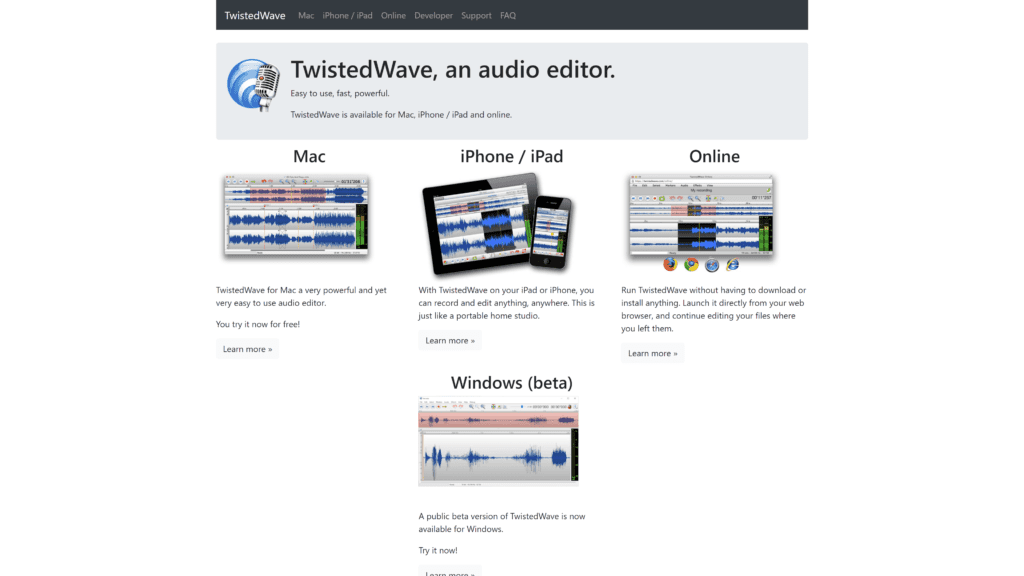
The TwistedWave podcast editor offers a solid option for those who want an easy-to-use interface.
The podcast editing software reveals a clean and straightforward design.
As a result, you can get up and running quickly without having to wade through a bunch of complicated features.
Why Is TwistedWave a Great Option?
The podcast editor provides an impressive list of features, including the ability to edit podcast episodes in real-time, add effects and processors, and export files in multiple formats.
The podcast editor’s clean and straightforward design makes it simple to use, even if you’re about to edit your first podcast.
Drawbacks to TwistedWave
Although TwistedWave is a quality podcast editor, it doesn’t offer some of the more advanced features that podcast editors need, such as the ability to remove noise from recordings.
As a result, you may want to look elsewhere if you require more than basic editing features.
Additionally, the solution only works on a Mac machine.
TwistedWave Pricing
- 0 to 1000 minutes: $0.10 per minute
- 1000 to 10,000 minutes: $0.08 per minute
- 10,000 to 100,000 minutes: $0.06 per minute
- 100,000 minutes or more: $0.04 per minute
Can You Try TwistedWave for Free?
The podcast editing software offers a free trial, so you can try it before you buy.
The trial lasts for 14 days.
After the trial expires, you’ll need to purchase a subscription.
Fission
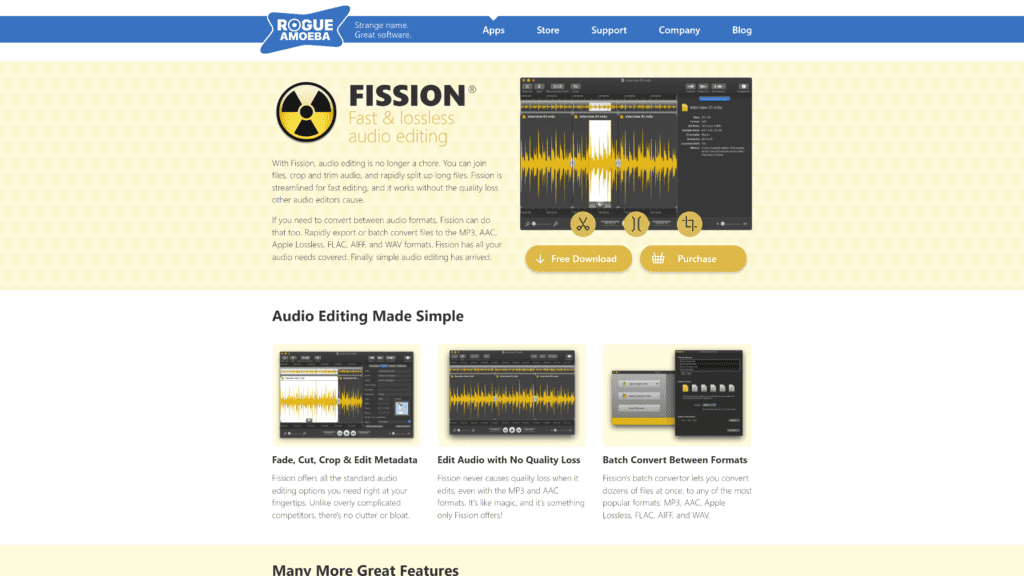
Use the Fission podcasting software for trimming, joining, and splitting audio files.
The podcast editor also comes with a set of basic features, such as the ability to add fades, adjust volumes, and remove noise.
The editing interface is a bit dated.
However, the software is easy to use, even if you’re new to podcast editing.
Why Is Fission a Great Option?
The Fission podcast editor offers a batch-processing feature that allows you to make the same changes to multiple files at once.
As a result, you can save time when editing podcast episodes.
Not only is this audio editor effective, but it won’t damage the quality of your audio files.
Drawbacks to Fission
The podcast editor doesn’t have some of the more advanced features that podcast editors need, such as the ability to add effects or processors.
Additionally, you may feel as though you’ve gone back in time a decade or two based on its limited dashboard.
Fission Pricing
- Fission License Key: $35
- Fission and Audio Hijack Bundle: $79
- Ultimate Podcast Bundle: $197
Can You Try Fission for Free?
Yes, there is a free download option.
You can only use the Fission free and paid versions if you use a Mac with an updated iOS system.
Even More Options To Check Out
If you can’t decide which podcast editing software to choose, here are six more options.
Every program has different capabilities that might suit your requirements better.
Pro Tools
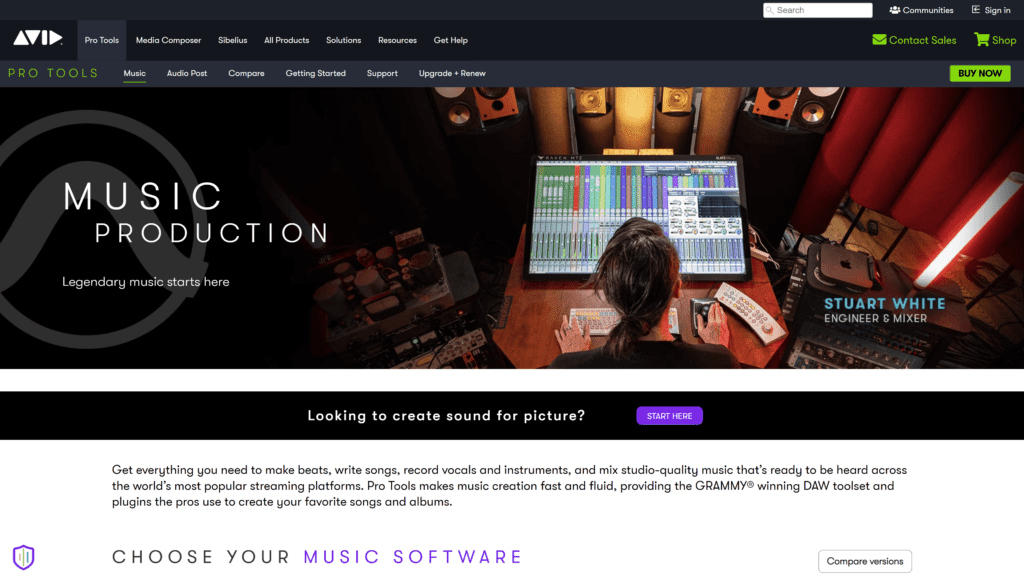
Pro Tools podcast editing software offers podcasters a solution for recording, editing, and mixing audio files.
The podcast editor provides an intuitive interface that makes it simple to get started with your editing work.
Additionally, Pro Tools comes with a comprehensive set of features, such as the ability to add effects and processors, export files in multiple formats, and support VST plug-ins.
Pro Tools does have drawbacks. Its main function is as a music editing tool.
It’s one of the oldest music editing software programs on the market.
The features cater more to musicians looking to write songs, make beats, and record musical instruments.
However, you can modify its use for the podcasting industry.
Auphonic
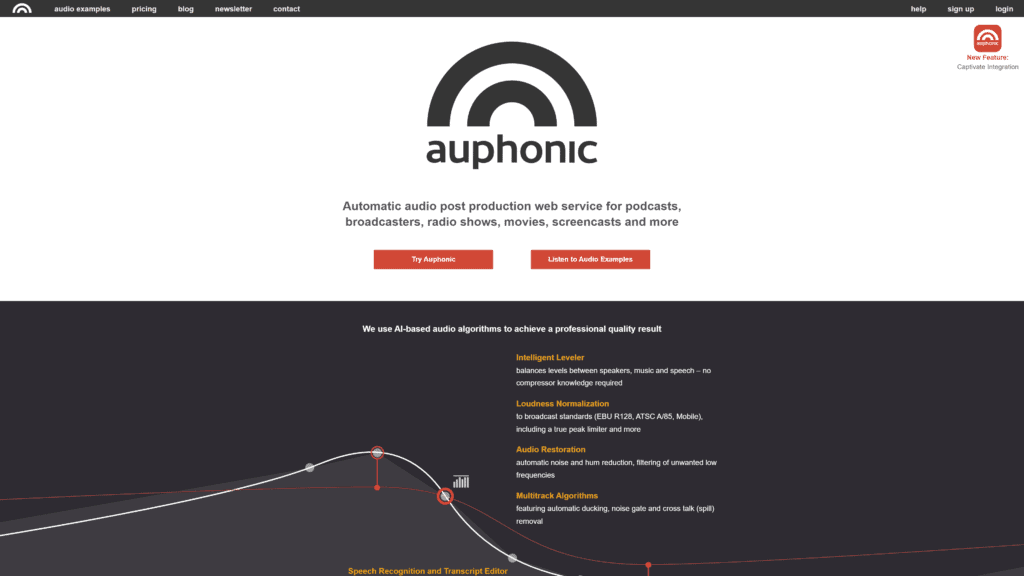
Auphonic podcast editing software analyzes and processes your audio files to ensure they meet broadcast standards.
The podcast editor can remove background noise, optimize levels, and add effects.
Auphonic will work well for movies, radio shows, screencasts, and other types of broadcasts.
It is an excellent choice for podcast editors who want to spend less time editing their audio files.
Auphonic doesn’t support VST plug-ins.
As well, you can’t use it to add music or sound effects to your audio files.
Quicktime
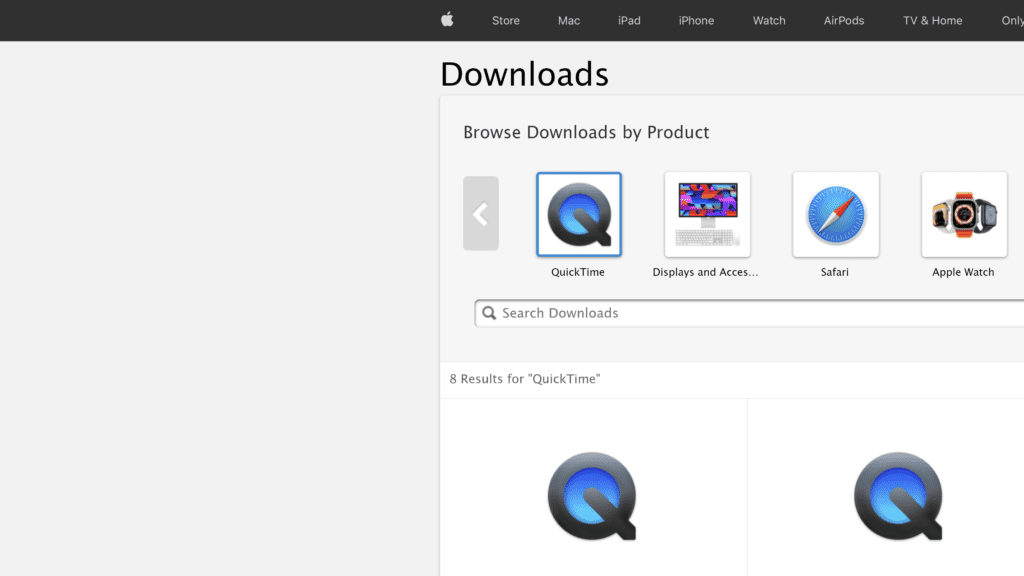
Quicktime is a basic editing software program that comes with a Mac computer.
Use this podcast editor to record, edit, and export audio files.
Its main features include the ability to add fades, change the pitch, and remove background noise.
Additionally, you might use Quicktime to record Skype calls or webinars.
While Quicktime can work well if you’re just starting, it doesn’t have as many features as some of the other podcast editing software programs on the market.
Hindenburg Journalist
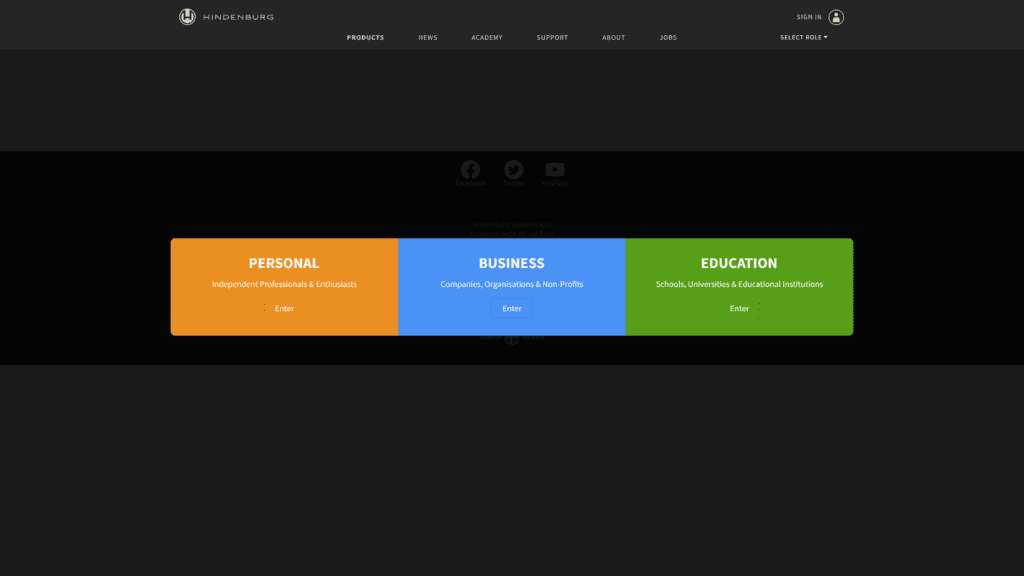
The Hindenburg podcast editor is a program most often used by journalists.
It offers an interface that you should find both user-friendly and stylish.
The podcast editor also comes with features that work well when editing podcast interviews.
You’ll discover features that include the ability to easily add interviews, music, and sound effects.
The podcast editor also gives you a recorder you can use if you need to interview over the phone.
Some podcast editors find its interface less intuitive than other podcast editing software programs.
Anchor
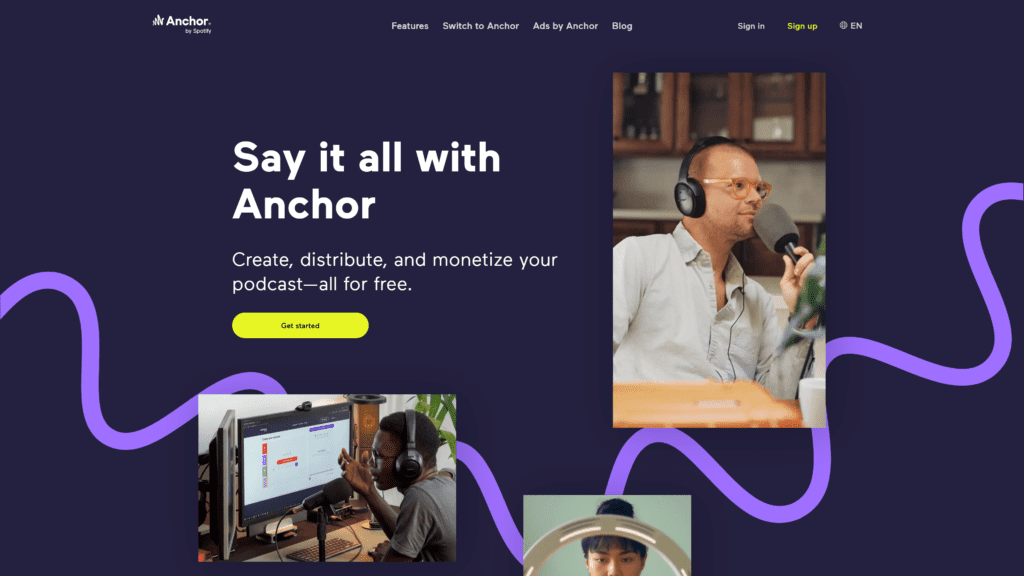
Anchor is a free editor and provides hosting for podcasts.
It comes with a recorder to record podcast episodes on your phone.
The editor also gives you the ability to add co-hosts, transitions, sound effects, and music.
Once you finish the recording and editing process, use Anchor to distribute your show.
Anchor doesn’t allow for the comprehensive edits that some other podcast editing software does.
Descript
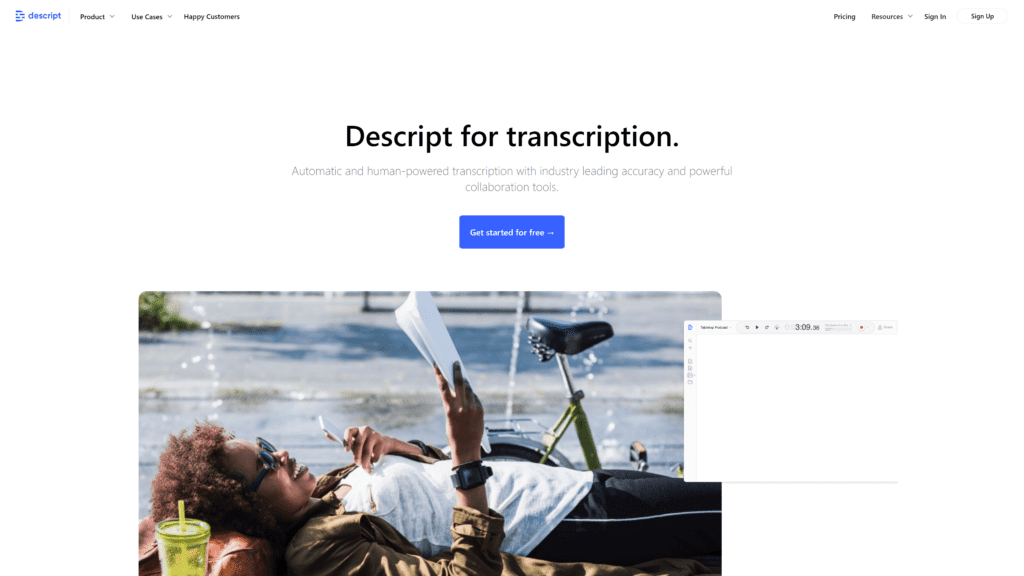
Descript podcast editing software is unique because it uses artificial intelligence to edit your audio files.
You can use it to transcribe your podcast episodes, add effects and transitions, and more.
The podcast editor also allows you to collaborate with other podcast editors.
Descript is still in its early stages.
It means that it doesn’t yet have all the features of some of the more established podcast editing software programs.
Other Products Relevant To Podcasting Editing Software
When you’re looking for podcast editing software, there are other types of software to think about.
Here are three related areas you can explore.
- Audio Editing Software: Using audio editing software, you can edit your audio files to remove any unwanted noise, for instance. The best audio programs will also let you add music and sound effects, change the pitch, and more.
- Best Podcast Platforms: A podcast platform is where you host your podcast episodes. It’s also where people can go to listen to your podcast.
- Podcast Name Generators: Not sure what to name your podcast? Use a podcast name generator to enter keywords. The generator will come up with a list of potential names for your podcast.
Frequently Asked Questions
Do you have any lingering questions about choosing your next podcast editing software solution?
What software do you use to edit a podcast?
The software you use depends on your needs and budget.
Some podcast editors use free software, such as Quicktime or Audacity, while others invest in more comprehensive solutions, such as Alitu or Adobe Audition.
What is the best podcast software?
The best podcast editing solution depends on what you want your software to do.
For example, some podcast editors favor transcription capabilities, while others emphasize an easy-to-use interface.
Wrapping Up
Our top pick for photo editing software is Alitu.
It hits the mark when it comes to including everything needed to start a podcast.
It’s easy to use, lets you splice files, and provides the required effects. Alitu comes with a reasonable price tag.
We like Adobe Audition as the runner-up choice due to its strip silence and loudness meter features.
To save you some time, we’ve gathered the above list of our favorite podcast editing software programs.
Choose your top option and start using it today.
